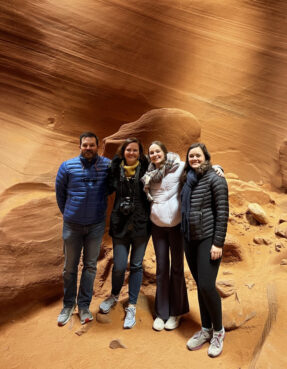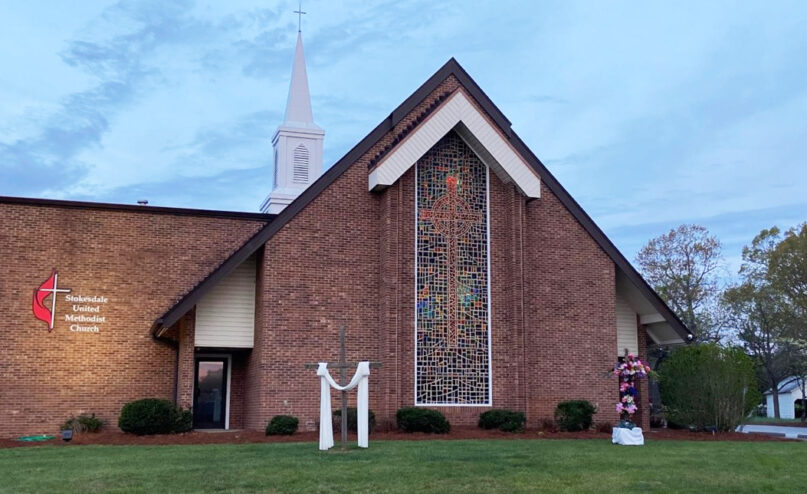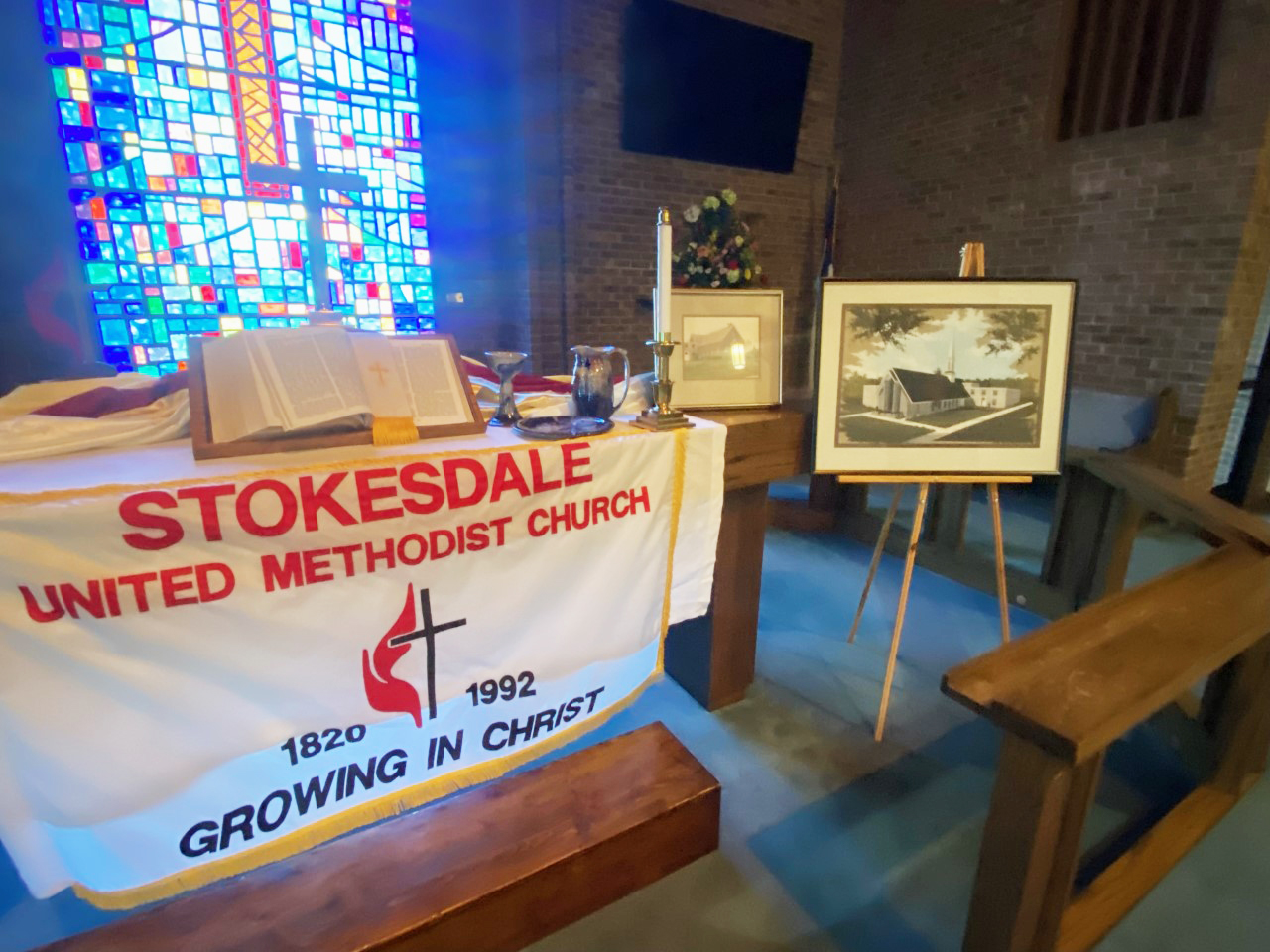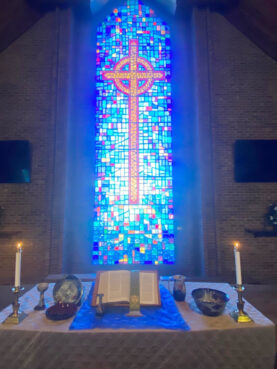(RNS) — After their congregation took a straw poll that showed the majority of members were in favor of breaking away from the United Methodist Church, Michael and Heather Hahn had to make a decision.
Should they stay with the church until it takes a final vote to disaffiliate?
Should they lobby members to remain a part of the denomination now embroiled in a drawn-out split over human sexuality?
Or should they move to another church as soon as possible?
In March, the couple chose to cut bait and left for another United Methodist church about 5 miles north of their home in Oak Ridge, North Carolina, a small, bedroom community of Greensboro.
“Ultimately where we ended up was, ‘There probably isn’t an opportunity to sway people from the path they’re on,” said Michael Hahn. “It’s probably time to look for another congregation to connect with.’”
The Hahns — Michael is a human resources professional; Heather is a schoolteacher — believe LGBTQ people deserve all the church rites of straight people.
They found a like-minded congregation at Stokesdale United Methodist, a rural church that voted to become a “Lighthouse Congregation” two months ago. The new designation describes a congregation eager to serve as a refuge for people who want to remain in the denominational fold.
Across the country, Methodists have begun a process akin to what social scientists describe as “sorting,” where people seek out like-minded communities with similar political, social and cultural worldviews, in this case religious.

The Hahns on a trip to Antelope Canyon in Arizona. From left to right: Michael, Heather, Ella and Lily. Photo courtesy of Hahn family
More than 2,400 United Methodist congregations out of a U.S. total of 30,000 have left the denomination since 2019, and many more are expected to before Dec. 31— the last date at which they can leave with their properties after paying apportionments and pension liabilities.
Most of the breakaway churches are joining the Global Methodist Church, a new denomination formed last year that is committed to a traditional view of sexuality; it will not ordain or marry LGBTQ people.
Now the United Methodist Church is turning its attention to taking care of those who want to remain and rebuilding its ranks.
Some 67 churches in the Western North Carolina Conference of the United Methodist Church have officially become Lighthouse Congregations. More than 80 Lighthouse churches have formed in the eastern part of the state, the North Carolina Conference. In joining the network, they have committed to remaining United Methodist.
“We cannot work with what is not there,” Bishop Thomas Bickerton, president of the denomination’s Council of Bishops, said at in a meeting in Chicago where he advised fellow clergy to spend more time on those who are staying. “But we can see it as a longtime overdue opportunity to reposition this denomination for its next expression.”
Lighthouse churches and their counterparts in other parts of the country — with names like Oasis, Bridge or Beacon churches — allow committed United Methodists to find one another in the midst of the turmoil roiling the nation’s second-largest Protestant denomination.
Other conferences, such as the Northwest Texas Conference, which lost nearly 75% of its congregations last year, are finding virtual solutions. The conference has launched an online church, streaming to more than 100 United Methodists in areas that no longer have United Methodist churches. The hope is that some watching may eventually become new United Methodist churches or satellite campuses of existing churches, said the Rev. Jeff Fisher, who co-pastors the missional online church.
RELATED: United Methodist bishops meet, look to pivot after 2,400+ churches disaffiliate
Stokesdale United Methodist has not yet accepted the Hahns or about 10 other families leaving Oak Ridge United Methodist, where 72% of its members voted recently to break away from the denomination.
But Pastor Ed McKinney said he expected the Hahns will join soon, along with members of other nearby churches not happy with their church’s withdrawal from the denomination. Stokesdale has an electric marquee with the words “All are welcome” out front. It will soon also have a big Lighthouse banner.
“They’re kind of in a trauma phase now — ‘What the heck happened to my church?’” said McKinney. “We’re helping them lick their wounds by offering spiritual and emotional support and space to grieve and worship.”
The Hahns said the decision to leave Oak Ridge United Methodist was difficult. They are leaving behind friends and family, including Michael’s parents. But the Hahns said they explained their reasoning to their two teenage daughters, both of whom understood and supported them.
“The heart of it is the issue of human sexuality,” said Michael Hahn. “That’s an issue my wife wrestled with. Jesus loved and accepted everyone. How can we stand in opposition to our brothers and sisters in Christ?”
That issue has also forced Allison and John Brady to find a Lighthouse church in Charlotte after the church they had been attending for 25 years made clear its intention to leave the United Methodist Church.
“I have a heart for people who don’t fit the norm, for people who are different, for kids who have a hard time fitting in,” said Allison Brady of Waxhaw, North Carolina. “If (a church) discriminates based on sexual orientation, they can discriminate against women or people of color. I don’t want to be part of a group that discriminates against any group of people.”
The Bradys found Light of Christ United Methodist Church in the Ballentyne neighborhood of Charlotte, a congregation of 300 with many LGBTQ members, including one queer minister. Like all Lighthouse churches, Light of Christ is committed to remaining United Methodist.
This weekend, at least seven annual conferences will hold special sessions to approve disaffiliations by churches in their areas. On Saturday (May 6), the Western North Carolina Conference is expected to approve the exit of 192 of its 956 churches, or about 20% of the total. It will hold another special session in November to approve the final batch of disaffiliations.
Western North Carolina Bishop Ken Carter said that soon after Saturday’s special session to approve disaffiliations, the conference plans to start 17 new rural churches.
In the meantime, Stokesdale United Methodist will continue to reach out to new potential members who are considering transferring their membership but still working through the pain of having to leave their old church. A program of support is planned for May 13.
Michael and Heather Hahn will be there. They’ve pretty much decided their future is at the Stokesdale church.
“What we’ve found is a congregation that’s warm and welcoming,” Michael Hahn said. “To a person, they said, ‘We’re glad to have you here. We want to do everything we can to support you.’ There was an openness and a willingness to walk along the journey with us.”
RELATED: ‘Not a real schism’: Four years later, UMC exodus less a gush, more a trickle







